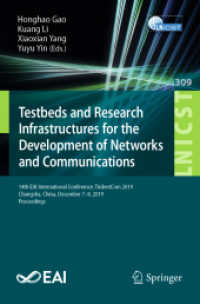- ホーム
- > 洋書
- > 英文書
- > Politics / International Relations
Full Description
A History of Modern Political Thought in East Central Europe is a synthetic work, authored by an international team of researchers, covering twenty national cultures and 250 years. It goes beyond the conventional nation-centered narratives and presents a novel vision especially sensitive to the cross-cultural entanglement of political ideas and discourses. Its principal aim is to make these cultures available for the global 'market of ideas' and revisit some of the basic assumptions about the history of modern political thought, and modernity as such.
The present volume is the final part of the project, following Volume I: Negotiating Modernity in the 'Long Nineteenth Century', and Volume II, Part I: Negotiating Modernity in the 'Short Twentieth Century' (1918-1968) (OUP, 2018). Its starting point is the defeat of the vision of 'socialism with a human face' in 1968 and the political discourses produced by the various 'consolidation' or 'normalization' regimes. It continues with mapping the exile communities' and domestic dissidents' critical engagement with the local democratic and anti-democratic traditions as well as with global trends. Rather than achieving the coveted 'end of history', however, the liberal democratic order created in East Central Europe after 1989 became increasingly contested from left and right alike. Thus, instead of a comfortable conclusion pointing to the European integration of most of these countries, the book closes with a reflection on the fragility of democracy in this part of the world and beyond.
Contents
Authors' Note
11: Late State Socialism: Consolidation, Legitimization, and Reform from Above
11.1: The raison d'état of 'really existing socialism'
11.2: National communism: Liberalization or neo-Stalinism?
11.3: The dilemmas of perestroika reformism
12: Political Thought in Exile
12.1: Ideological, generational, and institutional cleavages
12.2: The intellectual battle with communism
13: Dissidents and Opposition Movements
13.1: The emergence of dissident discourses and subcultures
13.2: Dialogue and empowerment
13.3: The identity politics of the dissidents
13.4: Toward a self-limiting revolution
PART III: Farewell to Modernity? Thinking Politics After the' End of History'
14: Velvet Revolutions and the Thorny Paths of Transition
14.1: Visions of democratic transformation
14.2: The ambiguities of the 'liberal consensus'
14.3: Coming to terms with the past
14.4: Church, religion, and democracy
15: 'Rebuilding the Boat on the Open Sea'
15.1: The dilemmas of state-building and constitutional reforms
15.2: The specter of ethnopopulism
15.3: Modes of coexistence
16: In Search of a New Ideology
16.1: The 'culture wars' of the 2000s
16.2: Radicalizing democracy
16.3: Centers and peripheries






